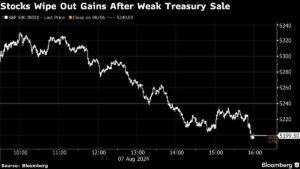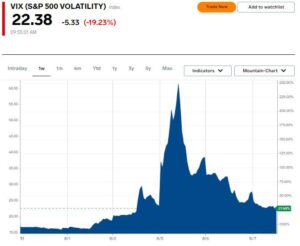1 Phenomenal Stock That Could Join Microsoft, Apple, Nvidia, Alphabet, Amazon, and Meta in the $1 Trillion Club

Recent developments in the field of artificial intelligence (AI) are having a dramatic impact on the technology landscape, which is evident in the market value of some of the world’s most technologically advanced businesses. What many of these companies have in common is that they’re trailblazers in AI.
Apple is currently the leader (as of this writing), with Microsoft currently at No. 2, with market caps of $3.4 trillion and $3.3 trillion, respectively. Nvidia‘s ascent has been breathtaking, adding nearly $2 trillion in value over the past year and climbing to $2.9 trillion to take the No. 3 spot. Alphabet, Amazon, and Meta Platforms — all at the forefront of the AI revolution — boast market caps of $2.2 trillion, $1.9 trillion, and $1.2 trillion, respectively.
With a market cap of just $387 billion, it might seem like a longshot to suggest that Oracle (NYSE: ORCL) might be in the running for membership in the $1 trillion club. However, an examination of the company’s recent results and commentary from management suggests the adoption of generative AI could push the company to new heights over the next few years.

A partner in AI
Oracle is in an enviable place in the AI revolution. It offers cloud, database, and enterprise-software solutions that are relied upon by 98% of the global Fortune 500 companies. Oracle’s information technology (IT) expertise makes it one of the go-to sources for enterprises looking to adopt generative AI solutions.
This has helped fuel solid overall growth. During Oracle’s fiscal 2024 fourth quarter (ended May 31), revenue of $14.3 billion grew 3% year over year, while operating income jumped 15% — but that doesn’t tell the whole story.
During the Q4 earnings call, Chairman and Chief Technology Officer Larry Ellison noted that the company had inked more than 30 AI-centric contracts worth more than $12 billion in the most recent quarter alone. This included some of the largest contracts in Oracle’s history. Ellison said he expects robust demand for generative AI to “turbocharge” the company’s cloud database growth.
This, in turn, pushed the company’s remaining performance obligation (RPO) — or contracts not yet recognized as revenue — to $98 billion, up 44% year over year. When RPO is growing faster than revenue, this suggests sales growth is accelerating. This helps to illustrate that Oracle is capitalizing on the growing demand for AI among its sizable customer base.
The path to $1 trillion
Oracle’s long track record of cloud and AI experience has many new and existing enterprise clients jumping on the generative AI bandwagon, looking to benefit from the increased productivity resulting from AI adoption. That said, fortune favors the patient, as this process will take some time to come to fruition.
According to Wall Street, Oracle is expected to generate revenue of $57.9 billion in its fiscal 2025 (which began June 1), giving it a forward price-to-sales (P/S) ratio of roughly 7. Assuming its P/S remains constant, Oracle would need to grow its revenue to approximately $148 billion annually to support a $1 trillion market cap.
Revenue grew by 11% year over year in the most recent quarter and is expected to accelerate to 15% for the fiscal year. If the company achieves 11% sales growth, Oracle could reach a $1 trillion market cap by 2034. However, if the company can maintain a growth rate of 15%, it would knock a couple of years off that timeline, reaching a $1 trillion market cap by 2032.
That said, estimates regarding the impact of generative AI adoption continue to ratchet higher. Conservative estimates suggest the market could grow to between $2.6 trillion and $4.4 trillion annually, according to global management consulting firm McKinsey & Company.
If Oracle continues to successfully tap into this AI opportunity and proceeds along its current growth trajectory, the company could achieve a $1 trillion market cap sooner than many expect.
Should you invest $1,000 in Oracle right now?
Before you buy stock in Oracle, consider this:
The Motley Fool Stock Advisor analyst team just identified what they believe are the 10 best stocks for investors to buy now… and Oracle wasn’t one of them. The 10 stocks that made the cut could produce monster returns in the coming years.
Consider when Nvidia made this list on April 15, 2005… if you invested $1,000 at the time of our recommendation, you’d have $700,076!*
Stock Advisor provides investors with an easy-to-follow blueprint for success, including guidance on building a portfolio, regular updates from analysts, and two new stock picks each month. The Stock Advisor service has more than quadrupled the return of S&P 500 since 2002*.
*Stock Advisor returns as of July 22, 2024
Suzanne Frey, an executive at Alphabet, is a member of The Motley Fool’s board of directors. Randi Zuckerberg, a former director of market development and spokeswoman for Facebook and sister to Meta Platforms CEO Mark Zuckerberg, is a member of The Motley Fool’s board of directors. John Mackey, former CEO of Whole Foods Market, an Amazon subsidiary, is a member of The Motley Fool’s board of directors. Danny Vena has positions in Alphabet, Amazon, Apple, Meta Platforms, Microsoft, and Nvidia. The Motley Fool has positions in and recommends Alphabet, Amazon, Apple, Meta Platforms, Microsoft, Nvidia, and Oracle. The Motley Fool recommends the following options: long January 2026 $395 calls on Microsoft and short January 2026 $405 calls on Microsoft. The Motley Fool has a disclosure policy.
1 Phenomenal Stock That Could Join Microsoft, Apple, Nvidia, Alphabet, Amazon, and Meta in the $1 Trillion Club was originally published by The Motley Fool








